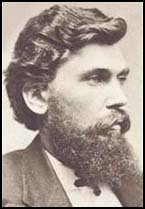Jenkin Lloyd Jones

Jenkin Lloyd Jones was born in 1843. The uncle of the architect, Frank Lloyd Wright, Jones became a Unitarian minister in Chicago. Jones became Missionary Secretary of the Western Unitarian Conference and editor of the liberal religious weekly, Unity .
In 1889 Jones became a strong supporter of the Hull House Settlement that had been established by Jane Addams and Ellen Starr in the run-down Nineteenth Ward of Chicago. Jones, an opponent of child labour and supporter of the early trade union movement, gave lectures at Hull House to recently arrived immigrants from Europe.
Jenkin Lloyd Jones died in 1918
Primary Sources
(1) Nora Marks, Chicago Tribune (19th May, 1890)
Miss Jane Addams and Miss Ellen Starr got tired of keeping their culture, and wealth, and social capacity to themselves. These young women believe that all luxury is right that can be shared. They have taken their books, pictures, learning, gentle manner, esthetic taste, to South Halsted Street.
From 9 to 12 a kindergarten under the direction of Miss Dow is held in the long drawing-room. In the afternoon the kindergarten furniture is removed and the hall is devoted to the use of various clubs and classes. With its beautiful walls and pictures it is easily turned into a drawing-room with the addition of a rug and chairs.
Monday afternoon the drawing-room is filled with Italian girls who sew, play games, and dance, and the little ones cut out pictures and paste them in scrapbooks. Sometimes they take a bath when they can be convinced of the beauty of the porcelain tubs.
Monday afternoon a club of young women meets and read Romola, aided by pictures of Florence, contemporary art, and lectures by Miss Starr on Florentine artists.
Monday evening belongs to the French, who are reviewing the old salons of Paris. Music, conversations, and coffee form the excuse for a brilliant evening, with an occasional lecture on Marie Antoinette and kindred subjects.
Tuesday afternoon the Schoolboys' Club meets, gets books from the circulating library, and has reading aloud. At the same time a girls' cooking class is at work in the kitchen. In the evening the boys come back and have a lecture on what to do in emergencies, or simple chemical experiments. One class is reading Shakespeare and others not so advanced are studying the three R's.
Wednesday evening the Workingmen's Discussion Club has the floor. The membership is already twenty-five, and many others who are interested attend. The Rev. Jenkin Lloyd Jones, Henry Demarest Lloyd, or some other well-known man delivers a short address, which is followed by the freest discussion on strikes, labour unions, the eight-hour question, child labour, etc.
Thursday afternoon Dr. Lelia Bedell talks to the women on physiology and hygiene and how to raise healthy children, even near the Chicago River. A cooking class is also being instructed. Thursday evening the German population turns out en masse for a social evening of reading, music, and "cakes and ale".
Friday afternoon the Schoolgirls' Club comes in to sew, embroider, and cook, each taking home a book from the library. Friday evening the working girls come in to enjoy a lecture or concert, and Saturday evening there is a typical Italian entertainment. These entertainments are crowded.
(2) Francis Hackett worked as a journalist with the Chicago Evening Post when he became a resident at Hull House in 1906. He wrote about his experiences in an article that was published in The Survey (June, 1925)
When I went to live in Hull House in 1906, I did not really know it, and I was totally ignorant of settlement work as I was devoid of missionary spirit. I was torn at that time between the two impulses of wanting to know Chicago and wanting to escape from it, and I went to Hull House both for escape and for reconcilement.
I went there as one always goes into a new experience, on the terms and in the light of the inappropriate things I already knew. Only very slowly did I frame for myself the kind of experience I was having. As I trusted myself to it gradually and suspiciously, and felt it gave back more than it was receiving from me, I began to realize the peculiar quality of this strange American creation, its quality of goodness, of intelligence, of decent conscience, which filled Hull House almost to overflowing, and which renewed itself constantly from Miss Addams as a fountain is renewed. Hull House not only recruited strong characters, it was excited about them.
We had a baptism once at hull House, a kind of vegetarian baptism. Jenkin Lloyd Jones officiated, looking like a behign old Druid, and the baby was the progeny of James Webber Linns. I do not know whether they handed that well-behaved baby a white flower, but I have a vague recollection of the kindly patriarch's tickling the soles of the baby's feet and adjuring her to walk in the paths of seemliness and righteousness.
